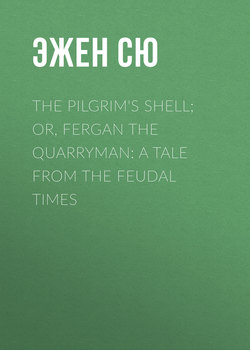Читать книгу The Pilgrim's Shell; Or, Fergan the Quarryman: A Tale from the Feudal Times - Эжен Сю - Страница 1
ОглавлениеTRANSLATOR'S PREFACE
In my introduction to "The Silver Cross; or, The Carpenter of Nazareth," I said:
"Eugene Sue wrote in French a monumental work – the Mysteries of the People; or, History of a Proletarian Family. It is a 'work of fiction'; yet it is the best universal history extant. Better than any work, avowedly on history, it graphically traces the special features of the several systems of class-rule as they succeeded each other from epoch to epoch, together with the nature of the struggle between the contending classes. The 'Law,' 'Order,' 'Patriotism,' 'Religion,' etc., etc., that each successive tyrant class, despite its change of form, hysterically has sought refuge in in order to justify its criminal existence whenever threatened; the varying economic causes of the oppression of the toilers; the mistakes incurred by these in their struggles for redress; the varying fortunes of the conflict; – all these social dramas are therein reproduced in a majestic series of 'historic novels,' that cover leading and successive episodes in the history of the race."
The present story – The Pilgrim's Shell; or, Fergan the Quarryman – is one of that majestic series, among the most majestic of the set, and, with regard to the social period that it describes – its institutions, its classes, its manners, its virtues and its crimes, and the characters that it builds – the most instructive treatise on feudalism, at the very time when the bourgeois or capitalist class was struggling for a foot-hold, and beginning to break through the thick feudal incrustation above. More fully than Molière's plays, and strangely supplemental of the best passages on the subject in the novels of George Eliot, The Pilgrim's Shell; or, Fergan the Quarryman chisels the struggling bourgeois on the feudal groundwork and background, in lines so sharp and true that both the present fully developed and ruling capitalist, inheritor of the feudal attribute of plundering, is seen in the historic ancestor of his class, and his class' refuse, the modern middle class man, is foreshadowed, now also struggling like his prototype of feudal days, to keep his head above water, but, differently from his prototype, who had his future before him, now with his future behind. This double development, inestimable in the comprehension of the tactical laws that the Labor or Socialist Movement demands, stands out clear with the aid of this work.
Eugene Sue has been termed a colorist, the Titian of French literature. It does not detract from his merits, it rather adds thereto, that his brush was also photographic. The leading characters in the story – Fergan, the type of the physically and mentally clean workingman; Bezenecq the Rich, the type of the embryonic bourgeois, visionary, craven and grasping; Martin the Prudent, the type of the "conservative workingman"; the Bishop of Laon, the type of usurping power in the mantle of religion; the seigneur of Plouernel, the type of the ingrain stupidity and prejudices that characterize the class grounded on might; a dazzling procession of women – Joan the Hunchback and Azenor the Pale, Perrette the Ribald and the dame of Haut-Pourcin, Yolande and Simonne, etc. – types of the variations in the form of woman's crucifixion under social systems grounded on class rule; Walter the Pennyless, the type of dispositions too indolent to oppose the wrongs they perceive, and crafty enough to dupe both dupers and duped; Garin, the type of the master's human sleuth – are figures, clad in historic garb, that either hurry or stalk imposingly over the boards, followed by mobs of their respective classes, and presenting a picture that thrills the heart from stage to stage, and leaves upon the mind rich deposits of solid information and crystalline thought.
As a novel, The Pilgrim's Shell; or, Fergan the Quarryman pleases, entertains and elevates; as an imparter of historic information and knowledge, it incites to thought and intelligent action. Whether as literature of pleasure or of study, the work deserves the broader field of the Socialist or Labor Movements of the English-speaking world, hereby afforded to it; and inversely, the Socialist or Labor Movements of the English-speaking world, entitled to the best, and none too good, that the Movements in other languages produce, can not but profit by the work, hereby rendered accessible to them.
DANIEL DE LEON.
New York, January 1, 1904.
